Related Research Articles

Richard Milhous Nixon was an American politician and lawyer who served as the 37th president of the United States from 1969 to 1974. A member of the Republican Party, he previously served as a representative and senator from California and as the 36th vice president from 1953 to 1961 under President Dwight D. Eisenhower. His presidency saw the reduction of U.S. involvement in the Vietnam War, détente with the Soviet Union and China, the Apollo 11 Moon landing, and the establishment of the Environmental Protection Agency and Occupational Safety and Health Administration. Nixon's second term ended early when he became the only U.S. president to resign from office, as a result of the Watergate scandal.

The Watergate scandal was a major political controversy in the United States during the presidency of Richard Nixon from 1972 to 1974, ultimately resulting in Nixon's resignation. The name originated from attempts by the Nixon administration to conceal its involvement in the June 17, 1972 break-in at the Democratic National Committee headquarters located in the Watergate Office Building in Washington, D.C.

Nixon is a 1995 American epic historical drama film directed by Oliver Stone, produced by Stone, Clayton Townsend, and Andrew G. Vajna, and written by Stone, Christopher Wilkinson, and Stephen J. Rievele, with significant contributions from "project consultants" Christopher Scheer and Robert Scheer. The film tells the story of the political and personal life of former U.S. President Richard Nixon, played by Anthony Hopkins.
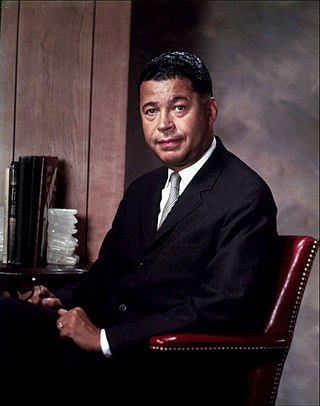
Edward William Brooke III was an American lawyer and politician who represented Massachusetts in the United States Senate from 1967 to 1979. A member of the Republican Party, he was the first African American elected to the United States Senate by popular vote. Prior to serving in the Senate, he served as the Attorney General of the Commonwealth of Massachusetts from 1963 until 1967. Edward Brooke was the first African-American since Reconstruction in 1874 to have been elected to the United States Senate and he was the first African-American United States senator since 1881 to have held a United States Senate seat. Edward Brooke was also the first African-American United States senator ever to have been re-elected to the United States Senate.
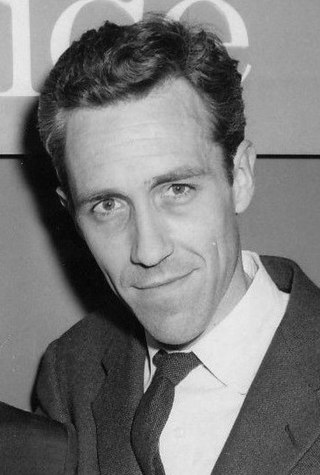
Jason Nelson Robards Jr. was an American actor. Known for his roles on stage and screen, he gained a reputation as an interpreter of the works of playwright Eugene O'Neill. Robards received numerous accolades and is one of 24 performers to have achieved the Triple Crown of Acting having earned competitive wins for two Academy Awards, a Tony Award, and a Emmy Award. He was inducted into the American Theatre Hall of Fame in 1979, and earned the National Medal of Arts in 1997, the Kennedy Center Honors in 1999.
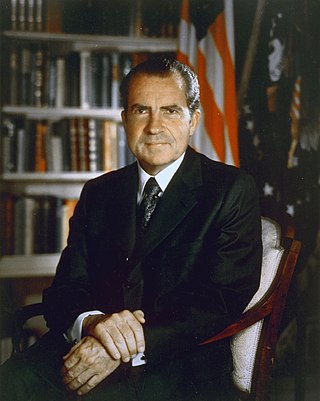
"Nixon's Enemies List" is the informal name of what started as a list of President of the United States Richard Nixon's major political opponents compiled by Charles Colson, written by George T. Bell, and sent in memorandum form to John Dean on September 9, 1971. The list was part of a campaign officially known as "Opponents List" and "Political Enemies Project".

Marvin Darnell Harrison Sr. is an American former professional football player who was a wide receiver for 13 seasons with the Indianapolis Colts of the National Football League (NFL), playing much of it with quarterback Peyton Manning. He played college football for the Syracuse Orange and was selected by the Colts in the first round of the 1996 NFL draft.

Lunar plaques are stainless steel commemorative plaques measuring 9 by 7+5⁄8 inches attached to the ladders on the descent stages of the United States Apollo Lunar Modules flown on lunar landing missions Apollo 11 through Apollo 17, to be left permanently on the lunar surface. The plaques were originally suggested and designed by NASA's head of technical services Jack Kinzler, who oversaw their production.
William Harrison Thomas is an American former professional football player who was a linebacker in the National Football League (NFL) for the Philadelphia Eagles (1991–1999) and Oakland Raiders (2000–2001) franchises.
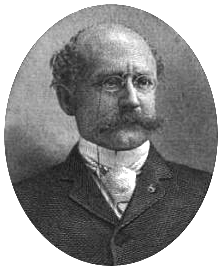
Henry Harrison Bingham was an American politician from Pennsylvania who served as a Republican member of the U.S. House of Representatives for Pennsylvania's 1st congressional district from 1879 to 1912. He was a Union Army officer in the American Civil War, fought in some of the key battles of the war and received the United States Military's highest award for valor, the Medal of Honor, for his actions at the Battle of the Wilderness.

The master list of Nixon's political opponents was a secret list compiled by US President Richard Nixon's Presidential Counselor Charles Colson. It was an expansion of the original Nixon's Enemies List of 20 key people considered opponents of Nixon. In total, the expanded list contained 220 people or organizations.
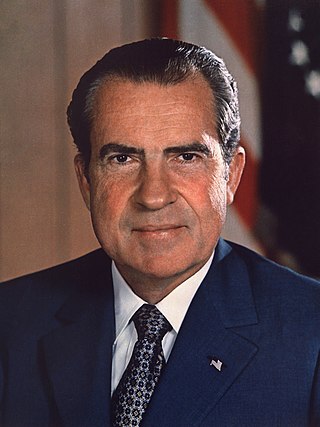
Richard Nixon's tenure as the 37th president of the United States began with his first inauguration on January 20, 1969, and ended when he resigned on August 9, 1974, in the face of almost certain impeachment and removal from office, the only U.S. president ever to do so. He was succeeded by Gerald Ford, whom he had appointed vice president after Spiro Agnew became embroiled in a separate corruption scandal and was forced to resign. Nixon, a prominent member of the Republican Party from California who previously served as vice president for two terms under president Dwight D. Eisenhower, took office following his narrow victory over Democrat incumbent vice president Hubert Humphrey and American Independent Party nominee George Wallace in the 1968 presidential election. Four years later, in the 1972 presidential election, he defeated Democrat nominee George McGovern, to win re-election in a landslide. Although he had built his reputation as a very active Republican campaigner, Nixon downplayed partisanship in his 1972 landslide re-election.

Arlin Marvin Adams was a United States circuit judge of the United States Court of Appeals for the Third Circuit. As late as 2013 he served as counsel to Schnader Harrison Segal & Lewis LLP, and was listed as a NAFTA adjudicator.
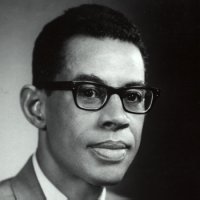
William H. Brown III is an American attorney. In 1963, he became a partner at the law firm of Norris Schmidt Green Harris Higginbotham & Brown, Philadelphia's first black-owned law firm. Brown was appointed to the U.S. Equal Employment Opportunity Commission (EEOC) by President Lyndon Johnson in 1968 and named its Chairman by President Richard Nixon in 1969. He was the fourth Chairman of the EEOC, serving from May 5, 1969, to December 23, 1973.
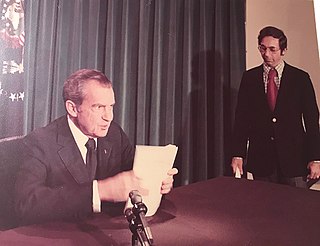
On August 8, 1974, U.S. President Richard Nixon delivered a nationally-televised speech to the American public from the Oval Office announcing his intention to resign the presidency the following day due to the Watergate scandal.

The 1879 Yale Bulldogs football team represented Yale University in the 1879 college football season. The team finished with a 3–0–2 record and was retroactively named co-national champion by Parke H. Davis.

The 1968 United States presidential election in Illinois took place on November 5, 1968, as part of the overall 1968 United States presidential election. Illinois voters selected 26 electors to represent the state in the Electoral College, which would then choose the president and vice president.

The 1960 United States presidential election in Mississippi took place on November 8, 1960, as part of the 1960 United States presidential election. Voters chose eight representatives, or electors to the Electoral College, who voted for president and vice president. This was the last election in which Mississippi had eight electoral votes: the Great Migration of Black Americans caused the state to lose congressional districts for the third time in four censuses before the next election.
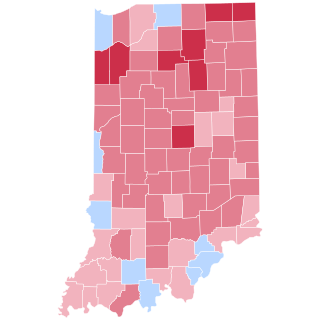
The 1968 United States presidential election in Indiana was held on November 5, 1968. State voters chose 13 representatives, or electors to the Electoral College, who voted for president and vice president.
References
- ↑ "Nixon's Enemies List Search Results". www.enemieslist.info. Retrieved 18 January 2023.
- ↑ Cusick, Frederick. (December 15, 1999). S. Harrison Dogole, Executive, Fundraiser. The Philadelphia Inquirer